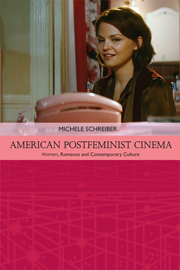Book contents
- Frontmatter
- Contents
- Acknowledgments
- List of Illustrations
- Introduction: Women, Postfeminism and Romance
- 1 ‘Both Glad and Sorry’: Romance Cycles and Women's Politics
- 2 Pragmatism vs. Sentimentality: Amelioration in the Postfeminist Cycle
- 3 Past vs. Present: Temporality in the Postfeminist Cycle
- 4 Sexy vs. Funny: Sexuality in the Postfeminist Cycle
- 5 Independence vs. Dependence: Economics in the Postfeminist Cycle
- Conclusion: Beginnings vs. Endings: the Future of the Postfeminist Cycle
- Selected Bibliography
- Index
1 - ‘Both Glad and Sorry’: Romance Cycles and Women's Politics
Published online by Cambridge University Press: 05 September 2014
- Frontmatter
- Contents
- Acknowledgments
- List of Illustrations
- Introduction: Women, Postfeminism and Romance
- 1 ‘Both Glad and Sorry’: Romance Cycles and Women's Politics
- 2 Pragmatism vs. Sentimentality: Amelioration in the Postfeminist Cycle
- 3 Past vs. Present: Temporality in the Postfeminist Cycle
- 4 Sexy vs. Funny: Sexuality in the Postfeminist Cycle
- 5 Independence vs. Dependence: Economics in the Postfeminist Cycle
- Conclusion: Beginnings vs. Endings: the Future of the Postfeminist Cycle
- Selected Bibliography
- Index
Summary
As we have seen, the postfeminist romance cycle has a reliable, known set of conventions that mythologizes the redemptive qualities of love and heterosexual coupling. It is by relying on and adhering to this known formula or structure that it negotiates historically contingent shifts in the Hollywood film industry, and the social and political terrain for women over the last thirty years. In this chapter, we will look more closely at what the postfeminist romance cycle has inherited from the romance film cycles that have preceded it, and what makes it unique. Close case studies of three female-centered films, the classic romance film Kitty Foyle, the ‘feminist’ romance film An UnMarried Woman, and the postfeminist romance film 27 Dresses, demonstrate how their respective eras of romance negotiate women's personal and political issues within the confines of classical or post-classical filmmaking.
Most studies of romance place films from different historical periods in separate chapters with their continuities merely implied or discussed in passing. Here the commonalities as well as the differences reveal how much Hollywood romance has stayed the same and the subtle but important ways that it has changed. Indeed, these three seemingly different films have a great deal in common. They all focus on strong and autonomous female protagonists who try to balance personal fulfillment with professional aspirations, ideas of fantasy with reality, and the past with the present. Whether by choice or circumstance, the protagonist is put in a position where she must overcome dreams and patterns that have shaped her past and opt for a different kind of future. This decision is intertwined with a wish for a romantic partner.
- Type
- Chapter
- Information
- American Postfeminist CinemaWomen, Romance and Contemporary Culture, pp. 27 - 54Publisher: Edinburgh University PressPrint publication year: 2014



